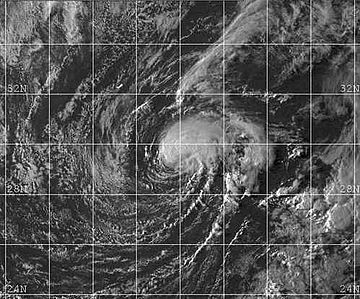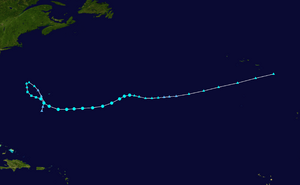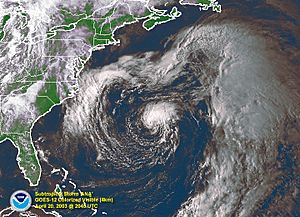Tropical Storm Ana (2003) facts for kids
| Tropical storm (SSHWS/NWS) | |

Tropical Storm Ana near peak intensity
|
|
| Formed | April 20, 2003 |
|---|---|
| Dissipated | April 24, 2003 |
| Highest winds | 1-minute sustained: 60 mph (95 km/h) |
| Lowest pressure | 994 mbar (hPa); 29.35 inHg |
| Fatalities | 2 direct |
| Damage | None |
| Areas affected | Florida, Bermuda |
| Part of the 2003 Atlantic hurricane season | |
Tropical Storm Ana was a unique storm in the Atlantic Ocean. It was the only tropical cyclone ever recorded in April. Ana was also the first tropical storm of the 2003 Atlantic hurricane season. This storm started as a subtropical cyclone and then changed into a tropical cyclone.
It formed on April 20, 2003, west of Bermuda. The storm moved east-southeast and became more organized. By April 21, it had become a tropical cyclone. Tropical Storm Ana then turned towards the east-northeast. It quickly lost its power due to strong wind shear and a nearby cold front. On April 24, Ana changed into an extratropical cyclone.
The storm passed near Bermuda, bringing light rain. Its leftover parts also caused rain in the Azores and the United Kingdom. Rough ocean waters from the storm caused a boat to flip over near the Florida coast. Sadly, two people died in this accident.
Contents
How Tropical Storm Ana Formed
A low pressure area started to form on April 18. This was south and southwest of Bermuda. A trough, which is a type of weather system, brought clouds into this low pressure area. The system then moved north. After that, it turned northwest and then looped back southeast.
Thunderstorms around the center of the storm grew stronger. Because of this, the storm was named Subtropical Storm Ana on April 20. At this time, it was about 250 miles (400 km) west of Bermuda.
Ana's Journey and Changes
The subtropical storm moved east-southeast and kept getting stronger. Experts believe Ana became a tropical storm by midnight UTC on April 21. When it became a tropical cyclone, Ana reached its strongest winds of 60 mph (95 km/h). Soon after, Ana passed close to Bermuda.
Strong wind shear began to break apart the thunderstorms around Ana. Wind shear is when winds blow at different speeds or in different directions at different heights. Ana continued to move eastward. Early on April 22, the wind shear again removed the thunderstorms from the storm's center.
After turning northeast, the main part of Ana joined with a cold front on April 24. This caused Tropical Storm Ana to change into an extratropical cyclone. The remains of the storm moved quickly east-northeast. It finally disappeared on April 27.
Impacts and Records of Ana
Before Ana formed, the government of Bermuda issued a gale warning for the island. When Ana became a storm, a tropical storm warning was also put out for Bermuda. The storm passed near Bermuda and dropped 2.63 inches (67 mm) of rain at the Bermuda International Airport. The winds on the island were not very strong.
Rough seas from the storm reached the coast of Florida in the United States. These stormy waters, along with other things, caused a boat to capsize in Jupiter Inlet. Two people on the boat drowned, but others were rescued.
The leftover parts of Ana also brought rain to other places. The city of Ponta Delgada in the Azores received 0.87 inches (22 mm) of rain. Clouds from Ana's remnants also caused rain in the United Kingdom. Two ships at sea experienced strong winds from Ana.
Ana was only the second subtropical cyclone ever recorded in the Atlantic basin during April. When it became a tropical cyclone, it was also the first Atlantic tropical storm in April. Because Ana did not cause a lot of damage, its name was not retired by the World Meteorological Organization. The name "Ana" was used again for another storm in 2009.
See also
 In Spanish: Tormenta tropical Ana (2003) para niños
In Spanish: Tormenta tropical Ana (2003) para niños
 | Calvin Brent |
 | Walter T. Bailey |
 | Martha Cassell Thompson |
 | Alberta Jeannette Cassell |



